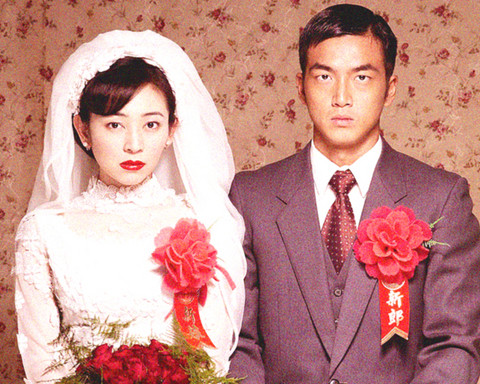This week, Tanshui is once more being celebrated in the reincarnation of Godot Theatre Company's perennial favorite Little Town of Tanshui.
Adapted from Thornton Wilder's Our Town, this is the play's fifth incarnation in Taiwan, which was first introduced on the stage for the Taiwan audience in 1989 and was last seen in 1999.
Why did writer and director James Liang (梁志民) feel the need to reinvent the story again?

PHOTO COURTESY OF GODOT
"It's been 17 years since audiences in Taiwan first experienced the story on stage," explains Godot's head of
marketing Alice Yang (楊玉玲).
"In each version, the presentation was always different to reflect the different actors and different tones. The play has always been very well received in all its different forms over the years so that audiences actually look forward to its next incarnation. For our performance this year, we wanted to capture the essence of Tanshui in a poetic, almost dream-like way, and to do so we used high-powered projectors to present subtle but very atmospheric paintings in the background as the story unfolds."
Set in the 40s and 50s in the then quiet port town of Tanshui, the story is told through a storyteller played by Tao Da-wei (陶大偉), who in his theaterical debut has the ability to pause, fast-forward, and rewind the events seen on stage. With him, we observe the characters in this town, mainly two families, the Chens and the Ais, and their children, particularly Shao-wei and Jasmine. The story follows their lives through 20 years of childhood, courtship, marriage and ends with Jasmine recollecting their lives together on Shao-wei's tomb.
In adapting the story for Taiwan, one might wonder, why Tanshui?
"Tanshui at that time was at its start of development," explains Yang.
"There were people arriving from the mainland, the local residents and the Mackay Memorial Hospital (馬偕醫院) doctors. It wasn't a rich or politically important town, and yet they all worked together harmoniously and over decades dedicated their lives to the land and slowly breathed life into the Tanshui we know today. In the process they showed the best side of humanity."
One of the key attractions of this year's variation is Tao who, himself a famous singer and father of pop icon David Tao, expressed his strong desire to appear for the first time on stage and to infuse the story with his unique trademark humor.
"This is ultimately, a simple story of life," says Yang. "There's a symbolic moment in the play when one of the characters gives birth to a baby, a magni-ficent moment of welcoming a new life into the world, only for the mother to die moments later. This play hopes to highlight the beauty, tragedy, joys and sorrows that occur for everyone in everyday life, and of course to remind all of us to cherish the moment."
What: Godot Theater Company's Little Town of Tanshui (
Where: Sun Yat-sen Memorial Hall, 505, Renai Rd, Sec 4, Taipei (
When: Tonight, tomorrow and Sunday at 7pm and tomorrow and Sunday at 2pm. For performances in other cities, visit www.godot.org.tw
Tickets: NT$400 to NT$2,500 and are available through www.artsticket.com.tw

Most heroes are remembered for the battles they fought. Taiwan’s Black Bat Squadron is remembered for flying into Chinese airspace 838 times between 1953 and 1967, and for the 148 men whose sacrifice bought the intelligence that kept Taiwan secure. Two-thirds of the squadron died carrying out missions most people wouldn’t learn about for another 40 years. The squadron lost 15 aircraft and 148 crew members over those 14 years, making it the deadliest unit in Taiwan’s military history by casualty rate. They flew at night, often at low altitudes, straight into some of the most heavily defended airspace in Asia.

Beijing’s ironic, abusive tantrums aimed at Japan since Japanese Prime Minister Sanae Takaichi publicly stated that a Taiwan contingency would be an existential crisis for Japan, have revealed for all the world to see that the People’s Republic of China (PRC) lusts after Okinawa. We all owe Takaichi a debt of thanks for getting the PRC to make that public. The PRC and its netizens, taking their cue from the Chinese Communist Party (CCP), are presenting Okinawa by mirroring the claims about Taiwan. Official PRC propaganda organs began to wax lyrical about Okinawa’s “unsettled status” beginning last month. A Global

Taiwan’s democracy is at risk. Be very alarmed. This is not a drill. The current constitutional crisis progressed slowly, then suddenly. Political tensions, partisan hostility and emotions are all running high right when cool heads and calm negotiation are most needed. Oxford defines brinkmanship as: “The art or practice of pursuing a dangerous policy to the limits of safety before stopping, especially in politics.” It says the term comes from a quote from a 1956 Cold War interview with then-American Secretary of State John Foster Dulles, when he said: ‘The ability to get to the verge without getting into the war is

Like much in the world today, theater has experienced major disruptions over the six years since COVID-19. The pandemic, the war in Ukraine and social media have created a new normal of geopolitical and information uncertainty, and the performing arts are not immune to these effects. “Ten years ago people wanted to come to the theater to engage with important issues, but now the Internet allows them to engage with those issues powerfully and immediately,” said Faith Tan, programming director of the Esplanade in Singapore, speaking last week in Japan. “One reaction to unpredictability has been a renewed emphasis on